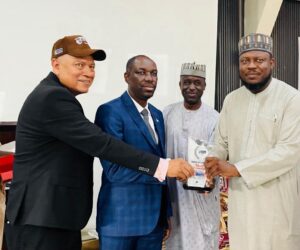The world is witnessing a quiet revolution. In Europe, Asia, and America, car engines that once roared with the sound of burning petrol are now humming silently with the power of electricity.
The global automobile industry is undergoing a historic transition from fossil fuel-powered engines to electric vehicles (EVs), driven by rising energy costs, climate concerns, and the need for cleaner technology.
In 2023 alone, over 14 million EVs were sold globally, according to the International Energy Agency (IEA). China accounted for the lion’s share, followed by Europe and the United States. By 2030, projections suggest that six out of every ten new cars sold will be electric.
SPONSOR AD
The reasons for this shift are not far-fetched. Stricter environmental regulations, falling lithium battery costs, and technological innovations are pushing automakers worldwide to abandon the internal combustion engine. Governments are equally backing the change.
This can be seen when the European Union has set 2035 as the deadline to phase out petrol and diesel car sales, while China is aggressively incentivizing both electric vehicle manufacturing and adoption. For Nigeria, the shift is no longer a matter of choice but of urgent necessity. The National Agency for Science and Engineering Infrastructure (NASENI) has been positioning itself at the heart of this transformation with new partnerships.
“Africa must not be left behind,” said the Executive Vice Chairman (EVC) of NASENI, Khalil Suleiman Halilu, during his recent visit to China. “While our purchasing power today is low-to-moderate, rising urban demand signals a huge market opportunity. We must prepare for the future of smart mobility” he added.
Beyond technology and economics, the move towards electric cars is primarily about saving lives. Fossil fuel consumption comes at a heavy environmental and health cost.
According to the World Health Organization (WHO), air pollution from vehicles contributes to respiratory illnesses, cardiovascular diseases, and premature deaths.
In Nigerian cities like Lagos, Port Harcourt, and Abuja, the thick smog that hangs in the air is evidence of thousands of vehicles releasing carbon monoxide, nitrogen oxides, and particulate matter into the atmosphere. Climate experts also warn that Nigeria, as Africa’s most populous country, cannot afford to continue on the fossil fuel path.
Some part of the country is already grappling with desertification, especially in the north, flooding in the south, and extreme weather patterns linked to climate change. Cutting down vehicle emissions through mass adoption of electric cars is one clear pathway to reducing Nigeria’s carbon footprint.
The economics of petrol no longer favours Nigerian vehicle owners. The removal of fuel subsidies in 2023 pushed pump prices to over ₦800 per litre in most parts of the country. For an average car owner, fuelling a vehicle now consumes a significant portion of income.
Globally, refined fuel costs have also remained unstable due to geopolitical conflicts, supply chain disruptions, and OPEC production policies. In contrast, electric vehicles, though often expensive to purchase, are significantly cheaper to run. Charging an electric vehicle costs a fraction of what it takes to fuel a petrol or diesel car.
This price differential is one of the major reasons adoption of electric vehicles is accelerating worldwide. In Nigeria, it has also ignited fresh conversations about diversifying transport energy sources, with NASENI seen as the national agency that can provide homegrown solutions.
Nigeria, with a population estimated at over 223 million, is Africa’s largest market for automobiles. According to the National Bureau of Statistics (NBS), more than 14 million vehicles ply Nigerian roads, with the majority powered by petrol.
The Nigerian National Petroleum Company Limited (NNPCL) estimates that the country consumes about 66 million litres of petrol daily. This massive appetite for fuel drains foreign reserves, increases environmental pollution, and deepens economic vulnerability.
If just 20 per cent of Nigerian vehicle owners switched to electric vehicles, analysts project that the country could save billions of naira annually in fuel import costs, while also reducing harmful emissions. Although few companies have begun assembling electric vehicles in Nigeria, none has the nationwide reach, technical depth, and government backing that NASENI commands.
During his recent trip to China, NASENI’s EVC met with Mr. Tongyue Yin, Chairman of Chery, one of the world’s leading electric vehicle manufacturers, to discuss local assembly and technology transfer. According to Halilu, “We are optimistic about partnerships that will help us crash the cost of electric vehicles in Nigeria and make them affordable to the masses.”
NASENI’s entry into electric vehicle manufacturing is seen as necessary because the cost of imported electric vehicles remains out of reach for most Nigerians. A locally manufactured alternative could drive prices down, create jobs, and stimulate local industries, from battery production to charging infrastructure.
Moreover, the adoption of indigenously manufactured electric vehicles in Nigeria could free up enormous financial resources currently spent on fuel imports. In 2022, Nigeria spent over $23 billion on petroleum product imports. By replacing even a fraction of this consumption with electric vehicles, the country could redirect scarce foreign exchange to more productive sectors of the economy.
Beyond savings, electric vehicle manufacturing could generate thousands of jobs in assembly plants, battery factories, and maintenance services. It could also stimulate Nigeria’s nascent renewable energy industry by creating demand for solar-powered charging stations.
NASENI is not looking at electric vehicles in isolation. The Agency is constructing a Renewable Energy Park in Gora, Nasarawa State, which will produce key components such as lithium batteries. This facility is expected to provide the backbone for electric vehicle manufacturing and sustainability in Nigeria.
By aligning electric vehicle production with renewable energy development, NASENI aims to create a closed-loop ecosystem where clean energy powers clean transport. This linkage will reduce dependence on fossil fuels, improve energy security, and place Nigeria firmly on the global clean technology map.
The necessity of NASENI’s intervention lies not just in producing electric vehicles but in leading a technological revolution that will reshape Nigeria’s mobility landscape for decades to come. With global momentum building and local demand rising, Nigeria cannot afford to be a passive observer.
As NASENI’s EVC noted, “#InfinitePossibilities await Nigeria’s smart mobility sector.” What is needed now is bold investments, coordinated policy, and public buy-in to drive the process as Nigeria stamps its ground to take its place amongst nations that are manufacturing electric vehicles and its accessories.







